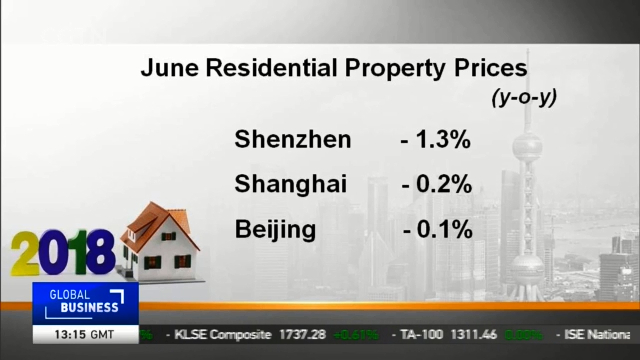
21:53, 17-Jul-2018
Property Market Performed: Steadily in 1st half 2018
Updated
21:49, 20-Jul-2018
03:14

Fresh data from the National Bureau of Statistics show that while prices for residential apartments in China's major cities rose at their quickest pace in five months during June, the gains still remained near recent multi-year lows. That notable stability indicates the success of a continual stream of new and detailed controls launched by local governments. Our reporter Chen Tong has been talking to some agencies and experts in Shanghai to find out how things are looking here.
Among the 70 major cities tracked by the statistics bureau, four first-tier cities had no price changes at all, from the same period in 2017. Beijing, Shanghai and Shenzhen actually saw year-on-year price declines in June, with Shenzhen dropping the most -- 1.3 percent. The property markets in lower-tier cities were not as sluggish as those in large ones, however. Prices in second and third tier cities saw a year-on-year jump of around 6 percent.
YAN YUEJIN, RESEARCH DIRECTOR E-HOUSE REAL ESTATE RESEARCH INSTITUTE "Xining in the northwest and Ji'nan in the northeast saw obvious increases and some 'stubborn' cities like Haikou also saw active performances. And there will be more policies to restrict the markets there. But the cities in which current policies have been well-enforced have all seen price declines in recent months."
CHEN TONG SHANGHAI "In addition to maintaining stability in property prices, the frequent launch of restrictions on buyers is another keystone of the current property market. Around 200 policies were launched in the first half of this year, which have reduced the number of potential buyers at real estate agencies."
This property agency in downtown Shanghai has seen an obvious drop in its business. The number of buyers coming through the door has fallen dramatically.
YU JIAJUN, DEPUTY BRANCH MANAGER CENTALINE PROPERTY "The number of potential buyers has declined a lot -- over 50 percent. 90 percent of the clients now are looking for better apartments, primarily larger ones."
Newer regulations mean this situation is likely to continue in the following months. Some cities have banned companies from purchasing apartments, and some are offering incentives for the rental market, as opposed to the sales market. Experts see more such regulations in the cards.
YAN YUEJIN, RESEARCH DIRECTOR E-HOUSE REAL ESTATE RESEARCH INSTITUTE "The current restrictions on purchases, loans and sales are substantial, and they will remain in force for the second half of this year. But some prefecture-level cities and third and fourth tier cities will probably come up with more in the following months. Those cities are primarily along the east coast and inland from there. We have to keep track of the performance in those cities because the adjustments in policies will affect the sales volume there."
The cooling sales market is also slowing things down on the investment side. Yesterday's data from the NBS showed investment in real estate development in the first half of the year grew 9.7 percent, 0.5 percentage points lower than in the first five months.

SITEMAP
Copyright © 2018 CGTN. Beijing ICP prepared NO.16065310-3
Copyright © 2018 CGTN. Beijing ICP prepared NO.16065310-3